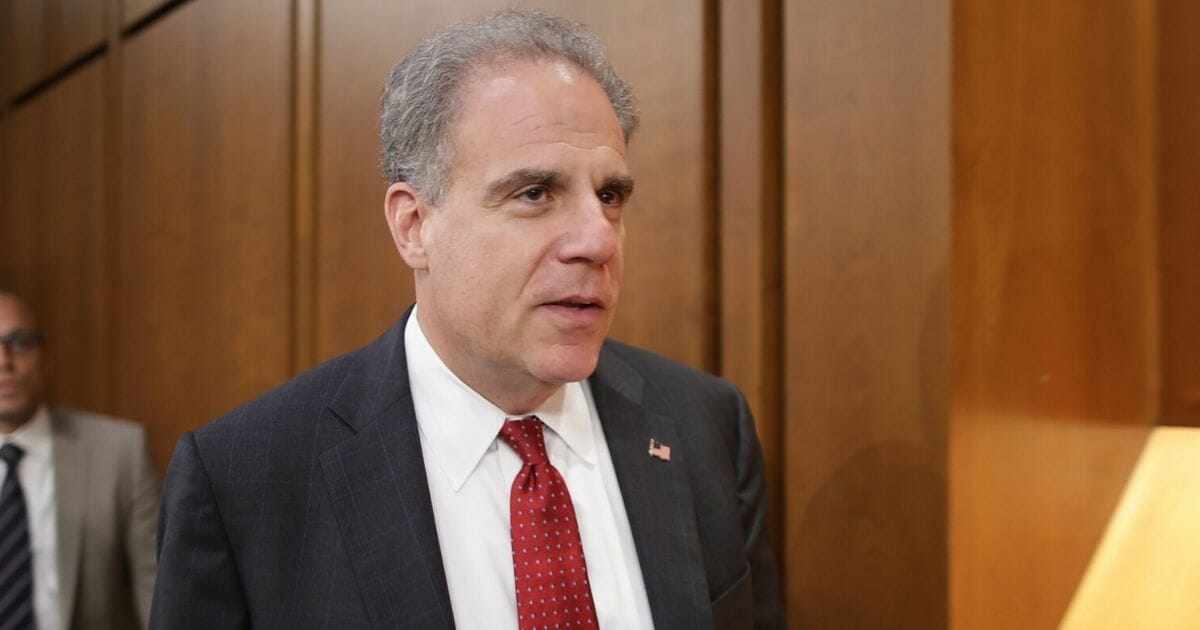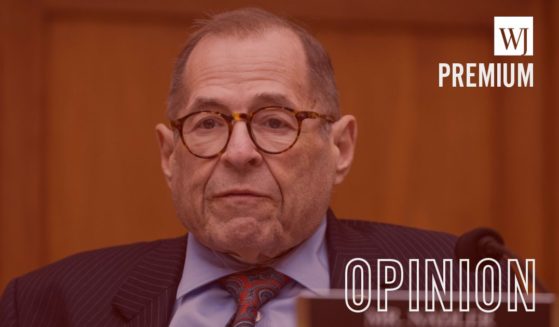
Here Are the 17 Worst FBI Findings Straight from the IG Report
It was curious to watch the victory lap that the left did over Inspector General Michael Horowitz’s report on the origins of the FBI’s investigation into the Trump campaign when there wasn’t actually any victory to claim.
There are so many articles to choose in the hours after the report was released Monday, but I must confess a certain affection for Caitlin Oprysko’s piece in Politico: “Here are the Russia probe conspiracy theories debunked by the DOJ inspector general report.”
OK, so what were these theories? “The Steele dossier didn’t play a role in opening the Russia probe,” (this wasn’t actually a theory, nearest I can remember), “Neither did Lisa Page or Peter Strzok,” (same) and “Joseph Mifsud was never an FBI informant” (which doesn’t make Mifsud any less weird, just not an FBI informant).
So, all right. Those conspiracy theories — which really weren’t theories at all to most who’ve followed the investigation — were debunked. What did the report actually say?
If you’re one of the people who swears by the absolute rectitude of the origins of the Trump investigation, it wasn’t a good day.
John Solomon — the investigative reporter and Fox News contributor currently loathed by the Democrats — has listed 17 findings from the inspector general’s report that didn’t exactly make the FBI look stellar in its pursuit of the Trump campaign, which was code-named Crossfire Hurricane.
The report particularly criticized the FBI’s conduct in getting surveillance approval from the secret court established by the Foreign Intelligence Surveillance Act.
For instance, when it came to Carter Page — the Trump campaign aide who was the subject of the FISA warrant — the report “[o]mitted information the FBI had obtained from another U.S. government agency detailing its prior relationship with Page, including that Page had been approved as an ‘operational contact’ for the [another government agency] from 2008 to 2013, and that Page had provided information to the other agency concerning his prior contacts with certain Russian intelligence officers, one of which overlapped with facts asserted in the FISA application.”
And then there was Christopher Steele, the man behind the now-debunked “Steele dossier.”
Item number two involved the FBI’s characterization of Steele, whose previous work, it said in court filings, had been “corroborated and used in criminal proceedings.”
Item number three “[o]mitted information relevant to the reliability of Person 1, a key Steele sub-source … namely that (1) Steele himself told members of the Crossfire Hurricane team that Person 1 was a ‘boaster’ and an ‘egoist’” and “may engage in some embellishment.’”
Number four: Steele said that he “had told the FBI that he only shared his election-related research with the FBI and Fusion GPS, his client.” Given his leaks to the media — and the fact that he talked about his findings with the State Department, as well — that’s a lie.
Number five had to do with Trump campaign adviser George Papadopoulos. The FISA warrant application omitted “Papadopoulos’s consensually monitored statements to an FBI [confidential human source] in September 2016 denying that anyone associated with the Trump campaign was collaborating with Russia or with outside groups like Wikileaks in the release of emails.” That’s a fairly key piece of information (italics were added).
So were “[Carter] Page’s consensually monitored statements to an FBI [confidential human source] in August 2016 that Page had ‘literally never met’ or ‘said one word to’ [one-time Trump campaign chairman] Paul Manafort and that Manafort had not responded to any of Page’s emails; if true, those statements were in tension with claims … that Page was participating in a conspiracy with Russia by acting as an intermediary for Manafort on behalf of the Trump campaign.”
As for number seven, there were statements the FBI monitored from Carter Page “that the FBI believed supported its theory that Page was an agent of Russia” that were included in the FISA application. Not included were statements that Page made that were inconsistent with the theory — statements that would have contradicted claims the FBI made about Page meeting secretly with Russian agents involving sharing “derogatory information about candidate Clinton.”
Number eight? The FBI “[o]mitted the fact that Steele’s Primary Sub-source, who the FBI found credible, had made statements in January 2017 raising significant questions about the reliability of allegations included in the FISA applications, including, for example, that he/she had no discussion with Person 1 concerning WikiLeaks and there was ‘nothing bad’ about the communications between the Kremlin and the Trump team…”
Number nine is another omission: This time the fact that the FBI didn’t bother to tell the FISA court about “Page’s prior relationship with another U.S. government agency, despite being reminded by the other agency in June 2017, prior to the filing of the final renewal application, about Page’s past status with that other agency.”
You won’t believe that number 10 is another omission, this time regarding Steele’s history of poor performance. While he didn’t report “in bad faith,” one individual said, he “[d]emonstrates lack of self-awareness, poor judgment,” “pursued people with political risk but no intelligence value,” “didn’t always exercise great judgment,” and it was “not clear what he would have done to validate” what he said. Again, not great qualities in a source for anything, much less investigating a United States presidential campaign and president.
Number 11 is a lie of omission as well, this time related to former Associate Deputy Attorney General Bruce Ohr. The FBI failed to relay “information obtained from Ohr about Steele and his election reporting, including that (1) Steele’s reporting was going to Clinton’s presidential campaign and others, (2) Simpson was paying Steele to discuss his reporting with the media, and (3) Steele was ‘desperate that Donald Trump not get elected and was passionate about him not being the U.S. President.'” Again, those are huge facts when it comes to assessing the value of Steele’s information.
Number 12 deals with the fact that the FBI didn’t update its description of Steele after it discovered information “that provided greater clarity on the political origins and connections of Steele’s reporting, including that [Fusion GPS founder Glenn] Simpson was hired by someone associated with the Democratic Party and/or the DNC.”
Lucky number 13? It had to do with Steele’s dealings with the media. The FBI decided not to “correct the assertion in the first FISA application that the FBI did not believe that Steele directly provided information to the reporter who wrote the September 23 Yahoo News article, even though there was no information … to support this claim and even after certain Crossfire Hurricane officials learned in 2017, before the third renewal application, of an admission that Steele made in a court filing about his interactions with the news media in the late summer and early fall of 2016.”
Number 14 also related to Steele’s credibility. An FBI source validation report found that Steele could continue to be used but that what he’d done in the past was “minimally corroborated.” The FBI didn’t bother mentioning this in its FISA warrant application and instead said that his past information had been “corroborated and used in criminal proceedings.”
Number 15 had to do with the fact that the FBI decided to omit (now there’s a word I don’t want to use any more for the next six years) Papadopoulos’ statements from “late October 2016 denying that the Trump campaign was involved in the circumstances of the DNC email hack.”
Number 16 had to do with that pesky Joseph Mifsud. The FBI omitted Mifsud’s “denials to the FBI that he supplied Papadopoulos with the information Papadopoulos shared with the FFG (suggesting that the campaign received an offer or suggestion of assistance from Russia).”
Finally, the FBI also decided to omit (there’s that word again) “information indicating that Page played no role in the Republican platform change on Russia’s annexation of Ukraine… which was inconsistent with a factual assertion relied upon to support probable cause in all four FISA applications.”
So yay! The IG report totally clears the FBI in terms of its handling of the Carter Page FISA application! Boy, don’t you feel stupid, you Republican conspiratorial hangers-on?
Look, if you expected the IG report to throw the curtain back on some deep-state rats’ nest that began with Joseph Mifsud being clandestinely recruited by Lisa Page and Peter Strzok under a Budapest streetlamp as if this were a le Carré novel, a) I’m sorry and b) get help.
However, if you’re out there trumpeting this as some sort of victory for the integrity of how the FISA warrant on Carter Page and the subsequent fallout was handled, a) I’m sorry and b) get help.
The IG report was in no way a victory for those who think Crossfire Hurricane was being done by the book. The only major “conspiracy theory” this debunked, however, was that there was nothing there. Those are the worst findings, so far.
As the report gets picked apart, be prepared for worse.
Truth and Accuracy
We are committed to truth and accuracy in all of our journalism. Read our editorial standards.
Advertise with The Western Journal and reach millions of highly engaged readers, while supporting our work. Advertise Today.












